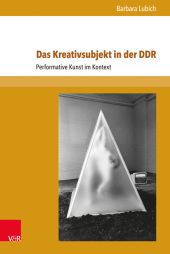 Neuerscheinungen 2014Stand: 2020-02-01 |
Schnellsuche
ISBN/Stichwort/Autor
|
Herderstraße 10
10625 Berlin
Tel.: 030 315 714 16
Fax 030 315 714 14
info@buchspektrum.de |

Barbara Lubich
Das Kreativsubjekt in der DDR
Performative Kunst im Kontext
2014. 454 S. mit zahlreichen Abbildungen. 23.5 cm
Verlag/Jahr: V&R UNIPRESS 2014
ISBN: 3-8471-0085-8 (3847100858)
Neue ISBN: 978-3-8471-0085-0 (9783847100850)
Preis und Lieferzeit: Bitte klicken
Kreativität in der Diktatur
Welchen Stellenwert hatte Kreativität in einer Diktatur wie der DDR? Ausgehend von der Arbeit von Tänzern, Musikern und Künstlern verschiedener Sparten beschäftigt sich dieses Buch mit dem Diskurs des Schöpferischen in der DDR und seiner Verbindung mit der Etablierung eines seit den 1960er Jahren aktuell gewordenen performativen Kunstkanons. Fine Kwiatkowski, A.R. Penck, Lutz Dammbeck, Gret Palucca u.a.: Ihre Improvisationen und performativen Kunstinterventionen fanden zum Teil durchaus in institutionalisiertem Rahmen statt, wurden aber auch als Kritik am vorherrschenden System verstanden. Ob ihre Kunst als politische Kommunikation verstanden wurde, war kontextabhängig. Deshalb blickt diese Arbeit mit einem transnationalen Blick auch auf scheinbar kunstfremde Wissensfelder wie die Sozialwissenschaften und die Kybernetik. Dort etablierte sich jene Sprache, welche als Legitimationsmittel neuer und alten künstlerischer Praktiken zum Einsatz kam. Das überraschende Ergebnis ist: Das für den Kapitalismus heute als hegemonial geltende Leitbild des Kreativsubjekts hatte in der DDR sein sozialistisches Pendant.
Nowadays, creativity is on everyone s lips: It is regarded as an expression of free thinking, as an artistic, social, and even economic potential. What status, however, did creativity have in a dictatorship such as the former GDR? Based on the work of dancers, musicians and artists of different genres, this book examines the discourse on creativity in the GDR and its connection to the establishment of a performative canon of art that had become relevant since the 1960ies. Fine Kwiatkowski, A.R. Penck, Lutz Dammbeck, Gret Palucca and others: Although their improvisations and performative art interventions did partly take place within an official, institutionalized framework, they were also perceived as criticism against or a rejection of the prevailing system. Whether or not their art was understood as political communication depended on the context. Therefore, this publication casts a transnational view on fields seemingly alien to art, such as social sciences and cybernetics. This is the realm in which the language that was used as a means of legitimizing new artistic practices established itself. The surprising result: The model of the creative subject, regarded as hegemonial in capitalism today, did have its socialist equivalent in the GDR.


